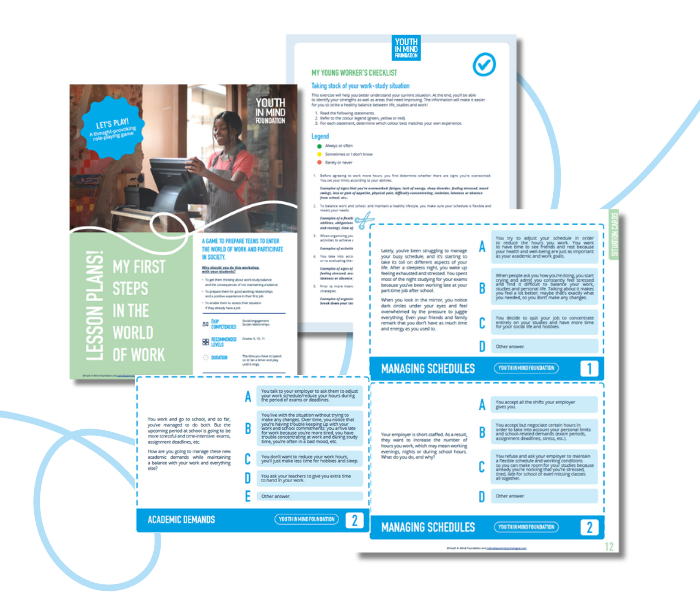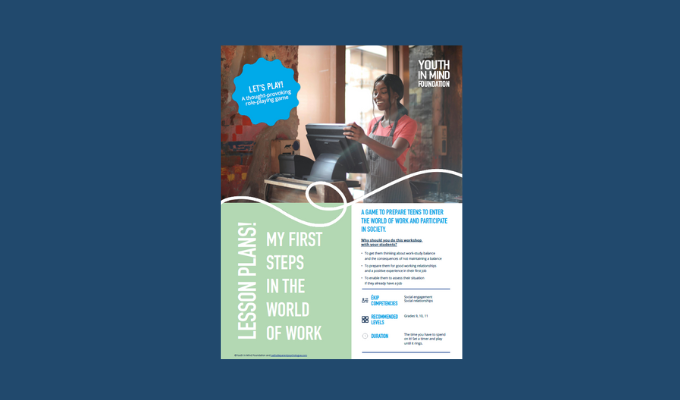New lesson plan
A game to get teens thinking about work-study balance
New lesson plan
A game to get teens thinking about work-study balance
Youth in Mind Foundation is pleased to present a new lesson plan, completely free: a game to prepare teens to enter the world of work and get them thinking about work-study balance.
This turnkey activity will get you thinking about and discussing a range of topics related to the world of work:
|
|
DOWNLOAD OUR FREE GUIDED LESSON PLAN
CLICK HERE
In this tool, you'll find:
- The game material to print out (including 26 situation cards)
- Information about working teens and the benefits of work on their development and their mental health
- Detailed instructions to guide you step by step through the game
- Practical advice, tools and resources for teens
Can you think of a fellow teacher, counsellor or guidance professional who might be interested? Share this tool with them!
Download our complete gameWHY CAN SCHOOL HELP YOUNG PEOPLE GAIN POSITIVE WORK EXPERIENCE AND LEARN ABOUT WORK-STUDY BALANCE?
In Quebec, about half of high-school students work during the school year.*
Having a first job can be a very good thing for a teenager’s mental health and personal development. It can positively impact their:
- Autonomy (emotional, financial, personal, relational)
- Confidence
- Self-esteem
Working during adolescence can provide a sense of self-fulfillment, meaning, direction and motivation for the future.
The important thing is to ensure that their needs (rest/sleep, nutrition, social and emotional life, autonomy/independence) continue to be met, so that work doesn’t make them more susceptible to physical or psychological exhaustion.
By 2022-2023, nearly 1 in 5 high school students (18%) were at risk of dropping out. Among employed students, the more hours young people work, the more likely they are to be at high risk of dropping out of school*.
Once a certain level of intensity is reached, the effects of work on a teen’s life balance and mental health become a cause for concern:
- Decreased motivation and drop in grades
- Fatigue and sleep deprivation
- Risk of work-related injuries
- A source of stress and anxiety
As someone working with teenagers, you are ideally positioned to help the next generation of adults transition smoothly to the job market by getting them to think about work-study balance, by equipping them with ways to successfully manage potential sources of stress and improve and maintain their health and well-being during the transition and beyond.
School can also be a great place for young people to learn more about their rights and responsibilities with respect to health and well-being in the workplace.
*Source: Enquête québécoise sur la santé des jeunes du secondaire
ALL OUR TOOLS FOR WORKING TEENS:

In collaboration with
Nathalie Parent
Psychologist, author, and speaker

Nathalie Parent
Psychologist, author, and speaker

Julie Brisson and Miriâm Roy-Bourbeau
Guidance counselors at the Centre de services scolaire Marguerite-Bourgeoysa and members of the Ordre des conseillers et conseillères d’orientation du Québec

Julie Brisson and Miriâm Roy-Bourbeau
Guidance counselors at the Centre de services scolaire Marguerite-Bourgeoysa and members of the Ordre des conseillers et conseillères d’orientation du Québec


